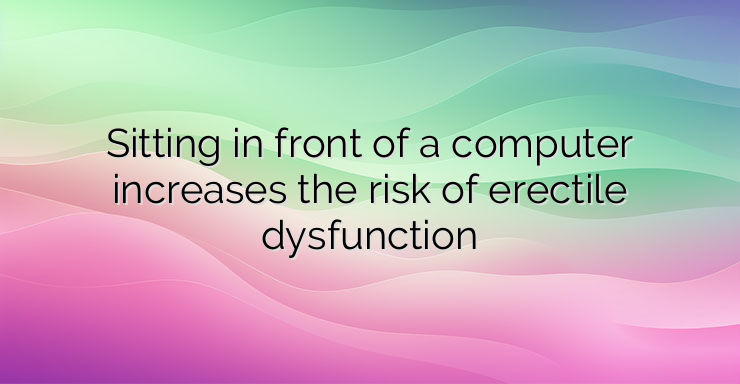Long standing in front of the computer leads to a higher probability of erectile dysfunction. According to a study presented in the journal Andrology, computer use can triple the likelihood of erectile dysfunction. Scientists from the Maritime Medical University in Shanghai, China, say that as a result of sitting, the production of follicle-stimulating hormone, which, along with testosterone, is involved in reproductive function in men and women, and in the production of sperm in men, is reduced. Low levels of the hormone also contribute to decreased libido, low energy, and an increased risk of infertility. Problems with the production of follicle-stimulating hormone arise due to disturbances in the activity of the hypothalamus in the brain – the area associated with the body’s homeostasis and sexual function. In the absence of physical activity, brain function is impaired. According to research from the University of California, a sedentary lifestyle leads to the thinning of certain brain areas – a risk factor for cognitive impairment and dementia. A sedentary lifestyle can lead to other health conditions causing erectile dysfunction. With insufficient physical activity, the energy in the body is not spent, which leads to an increase in body mass and fat accumulation. Obesity is a predisposing factor to a number of pathological conditions such as type 2 diabetes, hypertension, high cholesterol levels, heartburn, liver problems and cancer. Diabetes and cardiovascular disease are related to blood flow to the penis and are possible causes of erectile dysfunction. Diabetes can also damage the nerve cells around the penis. In cases of liver problems such as cirrhosis, testosterone levels drop – a predisposing factor for erectile problems. Other factors for the occurrence of erectile dysfunction are at the psychological level. Stress and anxiety affect blood vessel function and blood flow to the penis. Depression leads to decreased testosterone levels, and antidepressants can lead to decreased libido and erectile dysfunction. Erectile dysfunction has psychological consequences for men, including lack of confidence and low self-esteem. Long-term erectile dysfunction leads to reduced psychological and social well-being – increased risk of depression as well as anxiety. Problems with the partner also arise – lack of trust, feelings of unattractiveness and dissatisfaction. To reduce the risk of erectile dysfunction, regular physical activity is recommended to improve endurance and the function of the cardiovascular system. Thanks to sports, mental health also improves due to the release of serotonin and endorphins. References: Cost, B. Playing computer games can increase risk of erectile dysfunction, study finds. https://nypost.com/2024/03/20/lifestyle/computer-games-can-cause-erectile-dysfunction-study/ Huangfu, Z.A Mendelian randomization study on causal effects of leisure sedentary behavior on the risk of erectile dysfunction. https://onlinelibrary.wiley.com/doi/10.1111/andr.13611?utm_medium=email&utm_source=publicity&utm_campaign=publicity&utm_content=WRH_3_18_24&utm_term=ANDR Allen, M. The Psychology of Erectile Dysfunction. https://journals.sagepub.com/doi/10.1177/09637214231192269 Walther, A. Association of Testosterone Treatment With Alleviation of Depressive Symptoms in Men. https://jamanetwork.com/journals/jamapsychiatry/fullarticle/2712976 University of California � Los Angeles. Sitting is bad for your brain — not just your metabolism or heart. https://www.sciencedaily.com/releases/2018/04/180412141014.htm


Leave a Reply